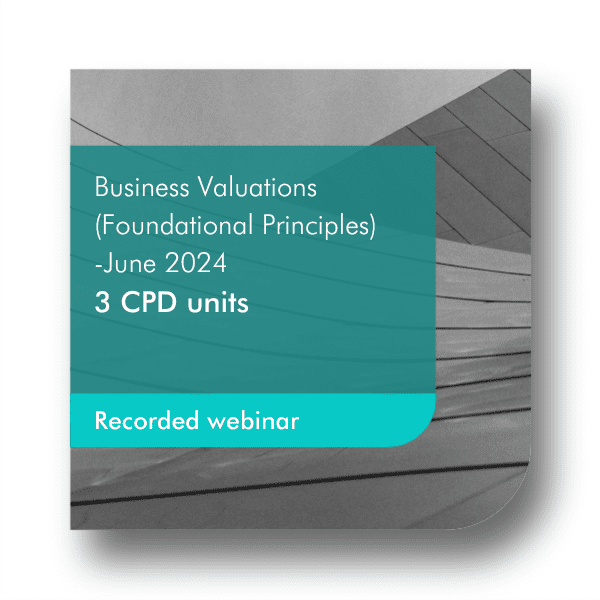
Leveraging Principles of Business Valuation for Long-term Sustainable Growth 2024
Available from
CPD
Course Category:
Level:
To provide guidance to clients on business valuation to facilitate informed decision-making in investment considerations. June 2024
Category: Financial Reporting
R 375 VAT Incl.
Product Information
What you will learn
By attending this webinar you will gain the following competencies:
- Understand the purpose and importance of business valuation and its relevance in various financial contexts including mergers, acquisitions, and investment analysis.
- Identify the fundamental principles of business valuation, including the concepts of fair market value and investment value.
- Develop an understanding of the three main approaches to business valuation and know when and why each valuation approach is used, highlighting their respective advantages and limitations.
- Be aware of the various factors that can affect the valuation of a business, such as market trends, industry conditions, and economic indicators.
- Acquire practical skill to read and interpret key financial statements used in business valuation, including balance sheets, income statements, and cash flow statements.
Description
As a trusted business advisor, an accountant must possess a strategic and technical understanding of the principles of business valuations, even if a client’s business is not for sale. This knowledge is a critical tool in an accountant’s arsenal to provide clients with not just a valuation but also strategic advice, performance benchmarking, and tax planning advice, and long-term growth strategies to maximize the value of their businesses in the long term.
Price
The following pricing apply:
Adhoc: R375.00
Content:
The webinar will cover the following topics:
- The Concept of value – Difference between Price and Value.
- The purpose of a business valuation.
- Investing in securities (stocks and bonds).
- Buying or selling a business.
- Raising capital.
- Strategic investments and disinvestments.
- Basic valuation inputs and assumptions.
- Use of historical financial information in business valuations.
- Assessment of business risk and risk profile.
- Comparable companies (peers) and comparable transactions.
- Assumptions about future growth.
- Required rate of return (Discount rate).
- Market-based approaches.
- Public company comparable.
- Precedent transaction comparable.
- Income based approaches.
- Discounted cash flow (DCF) models.
- Earnings capitalisation models.
- Asset-based approaches.
- Book value.
- Liquidation (fire sale value).
- Limitations of business valuation models.
- Subjectivity and assumptions.
- Uncertainty of future performance.
- Variability in views.
- Lack of comparability.
- Not an exact science.
Certificate
The following CPD is awarded 3 Units Financial Reporting.
Requirements
There are no preconditions for this course.
Moderate level.
Recorded webinar made available on a specified date.
Presenter
Bekithemba Ndebele ACCA
Bekithemba Ndebele is an Associate of the Chartered Certified Accountants (ACCA). He completed his articles with PNA Chartered Accountants in 2015 after which he worked in the private sector as Group Finance Manager at Shearwater Adventures (Pvt) Ltd until December 2020.
Bekithemba is currently a managing partner at Zuva Financial Services (Pty) Ltd where he is responsible for tax advisory, assurance, business valuations, accounting, and business mentorship and acceleration.
CIBA Academy Support
Login to CIBA Academy
Select My Dashboard
Select Submit a Ticket to log a new query
Your might also like
No results found.
